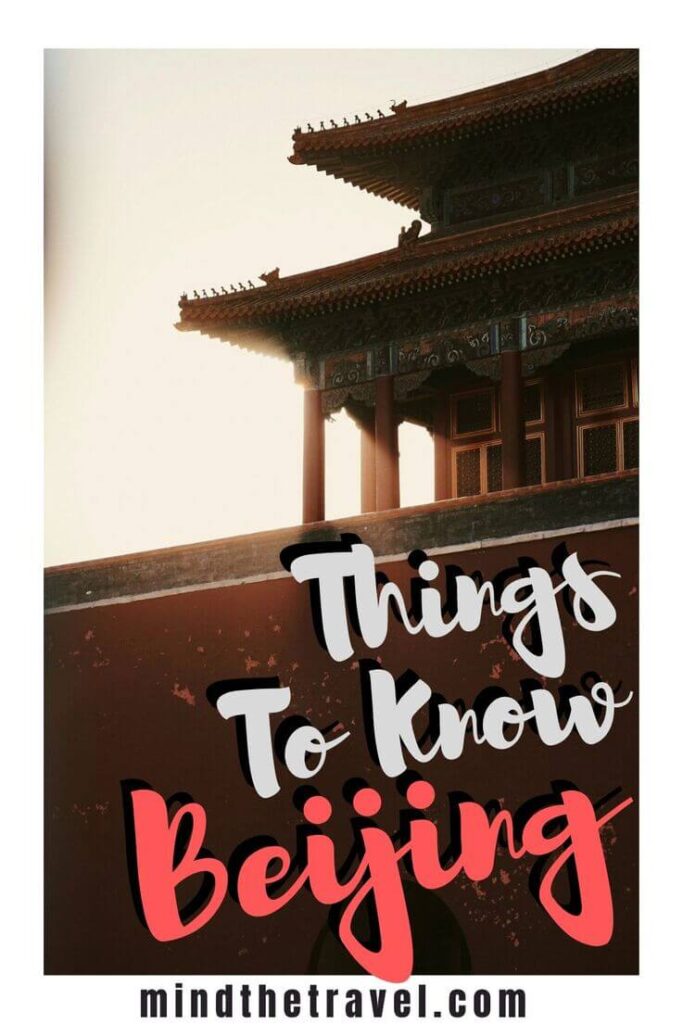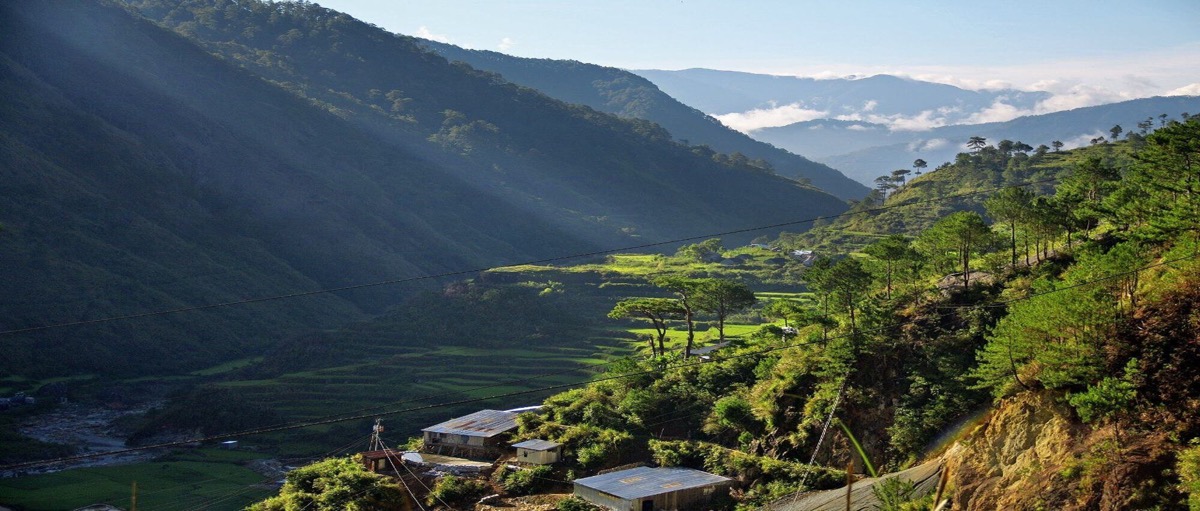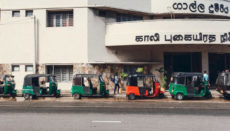Things Nobody Tells You About Visiting Beijing
After having spent almost a year as an expatriate in China, I’ve learned a few important lessons. Beijing is home to over 21 million people and it can be overwhelming on arrival: confusing Chinese characters everywhere, severe traffic congestion, fast-paced daily life and lots of people around you. If you know anyone who has been to Beijing, you probably have recognized they say things like “It’s such an amazing and ancient city” or “Beijing can keep you busy for days”, but then they’ll quickly follow-up their compliments by warning about just how different it is from the rest of the country. These are the things everyone tells you about the Chinese capital but what about all the little things nobody tells you about visiting Beijing?

Things Nobody Tells You About Visiting Beijing
1. Invest Time in Learning Mandarin Chinese

Although it might seem redundant to learn Chinese when visiting Beijing for only one week, it definitely makes sense to learn basic phrases when staying for several months. Standard Chinese isn’t the easiest language to learn, especially if you’ve not been learning it from a young age. With over 1 billion of native speakers, Chinese is the most widely spoken language in the world. If you only have a few weeks in Beijing, I’d suggest screen-shotting the key phrases and saving them on your phone. You can ask the staff at your hotel to write down the address in Chinese as well.
2. There Are a Lot of People All the Time, Everywhere

Read Next: How To Stop Procrastinating When Trip Planning
It’s that obvious, huh? There are almost 22 million people living in Beijing so you will never feel alone there. I know, it can be a little challenging to grasp it until you’re actually surrounded by it regularly. On the metro, out in the street, in the park, it’s not even that it’s really dense, like it is in Macau. But the sea of people just sort of goes on all the time. From an ordinary German perspective, it is like winter and summer sales or time before Christmas in the pedestrian shopping areas. The thing is, you get used to it but it might take some time.
3. Don’t Try To Protect Your Personal Space

Personal distance in Beijing is something completely different than we got used to having in Europe or the United States. The Chinese have small personal spaces. That’s because China has the largest population on the planet. So you should expect to have close personal contacts and people invading your personal space quite often. Before visiting Beijing, I thought I had mastered the technique for coping with the lack of personal space – boy, was I wrong. I think you will agree with me that in a city that has such a high population density, finding a secluded corner can be way harder than anywhere else in the world.
4. Parts of the Great Wall Are Really Steep

There are several sections of the Great Wall that you can reach as a day trip from Beijing. Badaling is the most popular and easiest option for independent travelers who want to get a quick glimpse of the Great Wall. Mutianyu may require a little bit more planning because you first have to hop on 916 bus and then to negotiate taxi fare to get to Mutianyu itself. Jiankou is totally wild and visiting it worth getting comfortable and reliable hiking boots.
Regardless of where you plan to go, you should expect some parts of the Great Wall to be really steep. The Badaling section is equipped with handrails, so it would convenient for people with disabilities.
5. Get a Virtual Private Network for China
Like so many travelers I use social media channels to document my travels. The thing is that The Great Firewall of China blocks sites such as Facebook, Twitter, and Instagram, not to mention Google. Before my first trip to Beijing, I would never have believed it possible. But trust it is so. Thus, if you want to access the Internet while you’re visiting Beijing, you’ll need to get a VPN. There are plenty of options, including free ones, but I’d recommend investing in a reliable VPN service that will not let you down.
6. Beijing Is a Safe City

My personal experience reflects that Beijing is nowhere near as aggressive as many guidebooks would have you believe. While the traffic is hectic and pickpocketing is more common in public places, Beijing, on the whole, is extremely safe for female travelers and solo travelers. The primary reason for this is the harsh punishment, i.e. the death penalty.
That being said, the majority of Beijingers are very decent people, but to avoid occasional pickpocketing incidents in public areas don’t stash money and gadgets behind you in a rear pocket. I always take off my backpack while waiting in line to buy a ticket because I never know who is that guy behind me.
7. You Can Actually Survive in Beijing Without Cash
Like in other major cities such as Hong Kong and Shanghai, you don’t have to carry a pocket full of cash and credit cards in Beijing. In fact, Chinese society just skipped the credit card era to jump directly into mobile payments. And these are becoming popular day by day. You can pay for your coffee, breakfast and even street food just by scanning a QR code on the window of a hole-in-the-wall eatery. It takes just a couple of seconds. Make sure to install popular apps such as Alipay or WeChat to pay by phone for movie tickets, household services and to shop for goods for delivery.
8. Getting Around Beijing is Easier Than You Think

Read More: How to Deal With Travel Envy
Beijing is getting bigger every year and there are hundreds of hotels, subway stations, and roads. If you travel on a budget like me, Beijing subway is the cheapest and easiest way to reach almost any point in the city within a 10-minute walk of a subway station. Signs and voice announcements are in English as are the ticket vending machines. You just need to press “English” (bottom left) and follow the instructions to purchase a ticket.
Taxi is your best bet if you want to avoid crowds in the underground. But when the traffic gets hectic at rush hour, walking is even faster. Taxis are often metered and it won’t take long to catch it. I’d recommend obtaining the name of your destination in Chinese characters to show taxi drivers and successfully overcome the language barrier.
9. Spend Less Time Outdoor on Days With Particularly Bad Pollution

Read Next: Whirlwind 7-Day Sri Lanka Itinerary
Beijing is notorious for having one of the highest levels of air pollution. Like many other larger cities in China, Beijing has serious problems with PM2.5 air pollution that makes locals stay indoor (or take the subway/car/train to work) and wear a face mask when they need to venture outside.
Having spent almost a year in Beijing I can say that on some days the air feels really thick and heavy, causing shortness of breath. While I haven’t had any problems with air pollution in Beijing because I opt to have decent PM2.5 protection, there are also surgical masks that are often cheaper but less effective. If you don’t want to expose yourself to risk, try to reduce outdoor activity on high pollution days and always check an AQI reading if you need to go outside.
10. Bring Toilet Paper and Prepare For Culture Shock
This may sound weird but most public toilets in Beijing (like in the rest of China) are often of the squatting type (prepare yourself mentally and physically) and normally there’s no toilet paper. The western-style seated toilets are most likely found in large cities, and then only in hotels, large shopping centers and airports, where they’re labeled as toilets for elderly people (i.e. ‘Oldman Toilet’). These tend to be clean and provide TP in their cubicles.
However, when it comes to visiting Beijing for the first time it is good to remember that the public toilets in the streets are often quite smelly. That is why I highly recommend bringing your own TP, sani-wipes or hand sanitizer.
11. Stick To Bottled Water
Is it safe to drink tap water in Beijing? Unlike many European countries, China hasn’t got a reputation for being totally clean and pollution-free. Living here for quite a while, I would stick to bottled water for drinking. Since locals are generally skeptical about water supply pipes. You may hear the authorities told the tap water is safe to drink and it looks clear, in fact, it may still contain hazardous contaminants like sediments, rusts, and chlorine. At the same time, don’t be afraid to brush your teeth or rinse your mouth with tap water – it is clear enough for that.
12. You Aren’t Expected To Tip
Listed among the things nobody tells you about visiting Beijing, tipping is not part of the Chinese culture. But there’s a catch. In expensive cities such as Hong Kong, Macau, and Shenzhen, it has become the norm to tip your guide, waiter or hotel porter in recognition of their good service. You don’t have to tip the taxi driver or when visiting fast-food restaurants. However, when visiting upscale restaurants you can tip the waiter. It entirely depends on delight and customer satisfaction. I once tipped a taxi driver because he made a special effort to reach my destination on time.
13. Beijing Is Somewhat Different

Visiting Beijing and seeing weird things people do such as spitting, urinating in public and slurping can be frustrating. With so many cultural differences between us, I believe it’s very important to learn some key values and generalities about Chinese society before going there.
Aside from the infamous language barrier, Western travelers in Beijing often struggle with the fact that in Chinese culture thinking before speaking is important. Mostly because it shows respect for other people. Communication style is indirect and travelers visiting Beijing will often need to learn to read between the lines.
14. Download Weixin
You probably think that Weixin and WeChat are the same but technically these are two different modes of the same app. WeChat is the default mode for international users, while Weixin refers to the Chinese mode of the app. Everyone in Beijing uses Weixin. Expats and locals alike. Download WeChat to connect with interest groups and make use of trustworthy resources such as Beijinger prior to your trip to China.
WeChat is a super convenient payment channel. Even the nearby hole-in-the-wall eateries across the street from my apartment had its own QR code that you can scan to pay with WeChat. Just set up your bank card and transfer money to anyone you want with just a text message.
15. Supermarkets Charge For Plastic Bags
Before going to Beijing for the first time for business, I did some quick research to reveal the best local food to try and places to eat. So I was really surprised to know that supermarkets in Beijing commonly charge customers for plastic bags. Don’t get me wrong. I love the idea of reusable bags and it seems that the authorities do their best to keep nature clean and healthy. With the prices ranging from just under 3 CNY in smaller towns to 5 CNY in large shopping malls, many Beijingers tend to bring eco-friendly bags.
The Bottom Line
Would I visit Beijing again? Absolutely! Am I beyond ready to leave after being here for several months? Yes. But you should definitely visit Beijing now! It’s super safe, really cheap, and the culture you will see will blow your mind. Hopefully, these 15 things I wish I’d known before visiting Beijing will help to prepare you for the good, bad, and ugly that you may experience while visiting this ancient city! Do you have any insider tips for visiting Beijing? Let me know in the comments below.





Sorry, the comment form is closed at this time.